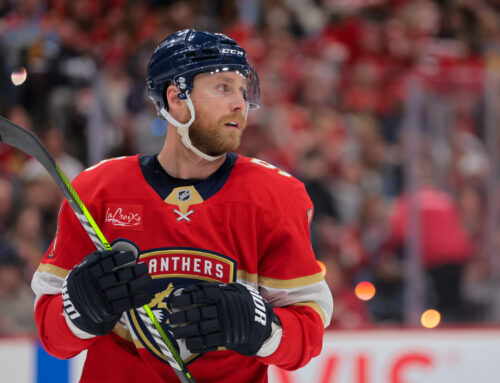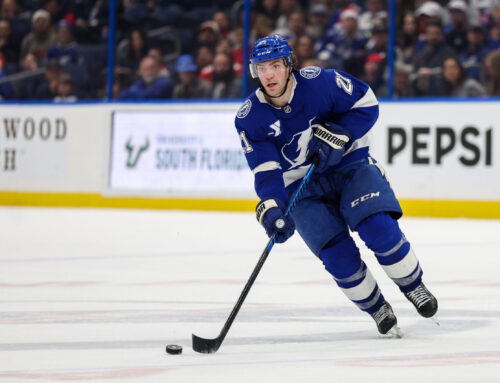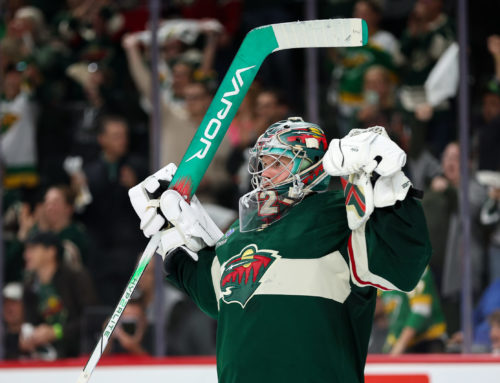
Who is the better fantasy own – Nathan MacKinnon or Alex Galchenyuk
This week we focus on Nathan MacKinnon and Alex Galchenyuk. Both have tasted success but also are seen as somewhat of a disappointment in fantasy circles given their draft slots and expectations that accompanied them entering the league as teens. Can either become a true NHL star; and should you be buying or selling one or both in your fantasy league? Time to find out – Cage Match starts now!
Career Path and Contract Status
MacKinnon was selected first overall in 2013 after back-to-back 75+ point production in the QMJHL. He landed in the NHL that same season, posting 63 points. But to most everyone’s surprise, that’s still his high mark after two more seasons. First, MacKinnon took a pronounced step back in 2014-15, to the tune of only 38 points in 64 games, for not even a 50 point full season pace. And this season, although he was a point per game player at the end of November, he cooled down considerably and stands at 52 points in 72 games, for only a 59 point pace.
Galchenyuk was drafted a year earlier than MacKinnon, going third overall after coming off a knee injury that cost him all but two games in 2011-12. He impressed in his first season, tying for fifth in rookie scoring despite the lowest Ice Time per game among any of the top ten. Galchenyuk also faltered as a sophomore (only 31 points in 65 games), and then managed just 46 in 80 games last season, which was barely above his rookie scoring pace. For 2015-16, Galchenyuk has been consistent other than a one point in ten games stretch in January, and has hit the 50 point threshold for the first time in his career.
Per Cap Friendly, MacKinnon is on the final season of his ELC that has a $0.925M cap hit cap per year, while Galchenyuk’s is on season one of two year deal that dings the cap at $2.8M annually.
Ice Time
|
Season |
Total Ice Time per game (rank among team’s forwards) |
PP Ice Time per game (rank among team’s forwards) |
SH Ice Time per game (rank among team’s forwards) |
|
2015-16 |
18:51 (N.M.) – 1st 16:06 (A.G.) – 5th |
2:55 (N.M.) – 1st 2:32 (A.G.) – 4th |
0:34 (N.M.) – 10th 0:02 (A.G.) – 12th |
|
2014-15 |
17:02 (N.M.) – 6th 16:25 (A.G.) – 5th |
2:26 (N.M.) – 4th 2:13 (A.G.) – 4th (tied) |
0:02 (N.M.) – 13th 0:03 (A.G.) – 14th |
|
2013-14 |
17:20 (N.M.) – 5th 14:23 (A.G.) – 8th |
2:20 (N.M.) – 8th 2:02 (A.G.) – 5th |
0:04 (N.M.) – 11th 0:01 (A.G.) – 14th |
|
2012-13 |
12:19 (A.G.) – 11th |
1:02 (A.G.) – 9th |
0:00 (A.G.) |
Galchenyuk was progressing nicely, gaining roughly 2:00 of Ice Time each season. But he hit a brick wall for 2015-16, not only failing to make another gain but seeing his Ice Time dialed back a bit. Fortunately, the upward trend remains in place with his PP Ice Time.
What should we make of this? Is Galchenyuk a player whose break out hasn’t occurred because the necessary Ice Time hasn’t been there? Or is it that if Galchenyuk was the “real deal” he’d be getting the Ice Time needed to post better numbers.
To find out, we can delve deeper into the Habs as a team. Right now, no Montreal forward is even approaching 19:00 in Ice Time per game, with three of the top five in Ice Time from last season having seen their Ice Time drop by even more than Galchenyuk’s. Also, when we subtract time on the PK, no Habs forward receives non-SH Ice Time of even 17:00 per game in 2015-16. Thus, Galchenyuk’s 16:03 of non-SH Ice Time actually is not that low in comparison to his teammates.
The takeaway is Galchenyuk’s Ice Time decrease is consistent with what’s happened to most of the Habs top six. That, in turn, allows poolies to “justify” the decrease while remaining realistic that he could still have a shot at fulfilling expectations if/when his Ice Time improves.
Meanwhile, MacKinnon has seen a nice jump in Total and PP Ice Times this season. Yet with these gains, where’s the uptick in points? As noted above, MacKinnon’s scoring pace for 2015-16 is actually a bit worse than his rookie production. Why is that? Here too, a deeper dive is helpful.
During MacKinnon’s 24 points in 24 games to start this season, he had 20:00+ in Ice Time 15 times (seven times 21:00+), while in 48 games since then, he’s crossed the 20:00 threshold only 14 times (just four of 21:00+). Although there is a possible chicken and egg argument that had he continued to play well he would’ve continued to receive the high Ice Time he needed to keep producing, the drop in Ice Time certainly does help explain/justify things more than had his Ice Time remained consistent. Long story short – it’s a less clear picture than might have been expected from season-long Ice Time data alone, and gives poolies hope he could be a 75+ point player if he received consistently high Ice Time.
Secondary Categories
|
Season |
PIMs (per game) |
Hits (per game) |
Blocked Shots (per game) |
Shots (per game) |
PP Points (per game) |
FOW (per game) |
|
0.27 (N.M.) 0.23 (A.G.) |
0.64 (N.M.) 0.77 (A.G.) |
0.73 (N.M.) 0.43 (A.G.) |
3.40 (N.M.) 2.48 (A.G.) |
0.22 (N.M.) 0.18 (A.G.) |
7.04 (N.M.) 4.26 (A.G.) |
|
|
2014-15 |
0.53 (N.M.) 0.48 (A.G.) |
0.67 (N.M.) 1.13 (A.G.) |
0.64 (N.M.) 0.55 (A.G.) |
3.00 (N.M.) 2.03 (A.G.) |
0.11 (N.M.) 0.15 (A.G.) |
3.14 (N.M.) 1.02 (A.G.) |
|
2013-14 |
0.31 (N.M.) 0.40 (A.G.) |
0.69 (N.M.)
📢 advertisement:
0.75 (A.G.) |
0.55 (N.M.) 0.38 (A.G.) |
2.94 (N.M.) 1.69 (A.G.) |
0.20 (N.M.) 0.15 (A.G.) |
2.36 (N.M.) 0.07 (A.G.) |
|
2012-13 |
0.41 (A.G.) |
0.48 (A.G.) |
0.52 (A.G.) |
1.64 (A.G.) |
0.02 (A.G.) |
1.23 (A.G.) |
Poolies have to like what they see here from MacKinnon, who’s Blocked Shots, Shots, and FOW have all increased with each season, while things like PIM and Hits have held steady. Plus, in his poor 2014-15 season, his PPP per game rate was roughly half what it was in 2013-14 and what it’s been this season. Had his PPP rate been 0.21 per game (i.e., the average of this season and 2013-14), his 2014-15 full season scoring pace would’ve been a more respectable 57.
Galchenyuk’s points-affecting stats, i.e., PPP and SOG, have been rising, which is a good sign. HIS FOW have increased as well, although only from what used to be downright horrible to now just subpar. Strangely, his PIM, Hits and Blocked Shots all jumped up considerably in 2014-15, but this season are back down to previous levels, suggesting last season was a fluke and making Galchenyuk comparable to MacKinnon in those categories.
Overall, it’s encouraging to see Galchenyuk’s improvements in PPP and SOG, especially since there’s room for both to realistically continue to rise. For MacKinnon, his gains in SOG and rebound in PPP are nice to see as well, although on paper he’s certainly closer than Galchenyuk to being maxed out in both, which is concerning given that MacKinnon has shown 60+ point season-long production only once.
Luck-Based Metrics
Galchenyuk’s 5×4 IPP for 2012-13 is not included because he didn’t play the required 50+ minutes for it to be charted.
|
Season |
Personal Shooting Percentage |
PDO/SPSV (5×5) |
IPP (5×5) |
IPP (5×4) |
Offensive Zone Starting % (5×5) |
|
2015-16 |
8.6% (N.M.) 14.3% (A.G.) |
998 (N.M.) 976 (A.G.) |
62.2% (N.M.) 75.6% (A.G.) |
56.5% (N.M.) 65.0% (A.G.) |
56.7% (N.M.) 63.7% (A.G.) |
|
2014-15 |
7.3% (N.M.) 12.3% (A.G.) |
992 (N.M.) 1014 (A.G.) |
80.6% (N.M.) 66.7% (A.G.) |
62.5% (N.M.) 52.9% (A.G.) |
48.4% (N.M.) 58.2% (A.G.) |
|
2013-14 |
10.0% (N.M.) 11.8% (A.G.) |
1040 (N.M.) 971 (A.G.) |
72.7% (N.M.) 78.3% (A.G.) |
71.4% (N.M.) 70.0% (A.G.) |
51.6% (N.M.) 50.5% (A.G.) |
|
2012-13 |
11.4% (A.G.) |
1045 (A.G.) |
78.1% (A.G.) |
N/A |
58.5% (A.G.) |
It’s a bad sign when Galchenyuk’s OZ% is considerably higher in his fourth season than it was as a rookie, yet has not led to Galchenyuk producing that much better. For this season, his OZ% ranks as the 13th highest out of the 346 forwards who’ve played 40+ games. And although the OZ% of some top NHL players (including Evgeni Malkin, John Tavares, and Patrick Kane) is even higher, they’re different from Galchenyuk in that they’re not only far more elite now, but they also were posting much better numbers by age 22 than Galchenyuk is now.
Seeing this, the concern is Galchenyuk might be more similar to some of the less distinguished players with higher OZ% numbers than him, like Craig Smith, Mike Ribeiro, Bobby Ryan, or James van Riemsdyk. These players are not well rounded enough to take the ice in all situations, yet arguably not productive enough to justify their high OZ% like a Malkin, Tavares, or Kane. Overall, this does not bode well for Galchenyuk, near or long term.
On the other hand, we see even more explanation for MacKinnon’s poor 2014-15 numbers. That season, his Personal Shooting % was the lowest of his three seasons. Had it been the 9.2% combined average of 2013-14 and 2015-16, that would’ve meant 3.5 more goals. So between that and his PPP adjustment, suddenly his 2014-15 scoring pace is up to 61.5. And that’s not even factoring in his very low OZ% from that season.
It’s also a bad luck story for MacKinnon this season. His IPPs don’t add up to even 120, which is a big drop from the 140+ he posted in each of his first two seasons. If instead those stood at the average of what they were in 2013-14 and 2014-15, that would mean an additional nine points, which would put MacKinnon at 61 in 72 games, for a full season scoring pace of 69.
Suddenly, MacKinnon’s 2014-15 doesn’t look so bad anymore; and his not having taken a step ahead in production for 2015-16 also seems forgivable. In sum, MacKinnon looks to have been victimized by different – but in both cases unsustainable – bad luck in the last two seasons.
Who Wins?
Before picking a winner, here’s an interesting player comparison for MacKinnon. By the end of 2015-16, he’ll have played in fewer than 225 games but posted more than 150 points. Since 2000-01, nine forwards who are still active and older than 25 (meaning we can get a better idea how they turned out) had once fit the same criteria. All nine (Jamie Benn, Henrik Zetterberg, Ryan Getzlaf, Sidney Crosby, Pavel Datsyuk, Jason Spezza, Jonathan Toews, Rick Nash, Paul Stastny) have scored at least 76 points in a single season, with all but Toews scoring 79+ at least once. Beyond that, Benn, Nash, and Datsyuk hadn’t hit 70 by their third season, just like MacKinnon.
What this helps underscore is, poolies should not write off MacKinnon – not yet at least, especially since a fair case can be made that he was a victim of unsustainable bad luck in 2014-15 (data suggests he would’ve posted a full season scoring pace of 61) and again in 2015-16 (he should be at a 69 point pace). Plus, Mackinnon showed he can produce at an 80+ point pace for nearly a third of this season when he got elite Ice Time; and that was despite the bad luck he was experiencing.
MacKinnon wins this match. He’s done more than Galchenyuk, and in fewer seasons; plus, the numbers suggest MacKinnon’s ceiling is realistically higher. Another key is Galchenyuk has demonstrated “real world” liabilities without accompanying superstar talent, such that he might end up being pigeonholed into a role as a purely offensive player without the Ice Time to be elite.
My recommendations are that MacKinnon looks like a decent buy low possibility, whereas Galchenyuk probably is a hold until he can put up enough solid short term stats to possibly consider selling. Of course, the risk is with each passing year more of the “new car shine” wears off Galchenyuk, to the point he becomes hard to sell for decent value. But most likely that point hasn’t been reached yet, so best to be patient and continue to hold for now and sell during a sustained hot streak.
One Comment
Leave A Comment
You must be logged in to post a comment.





 FLA
FLA CHI
CHI NYR
NYR PIT
PIT L.A
L.A COL
COL CBJ
CBJ BUF
BUF ANA
ANA MTL
MTL EDM
EDM S.J
S.J PHI
PHI OTT
OTT

Ok so totally ignore that McKinnon has been given top line minutes and top playing time and Galchenyuk has not. Look what Galchenyuk has done in the last month since being given both. 11 goals in 11 games and more than a PPG average.